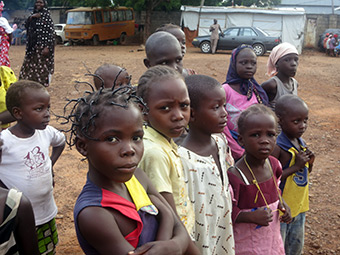remember to attend dg michael milston’s presention
Tuesday 4th October at 7.00pmEST and 8.00pm ESDT.
The email to attend the GoToMeeting has been sent to all members. All are welcome to attend. If you have not received the email with the link to the meeting please contact me – johnroberson@bigpond.com
What does it mean to practice peace?

Nations observe 21 September as International Day of Peace, a “day of global ceasefire and nonviolence.” Rotary’s commitment to building peace and resolving conflict is rooted in the Rotary Peace Centers, which yearly prepare up to 100 fellows to work for peace through a two-year master’s degree program or a three-month certificate program at partner universities worldwide.
- Learn how you can support the Rotary Peace Centers
- Discover 5 reasons to apply for a Rotary Peace Fellowship
New Englanders, Nigeria clubs aid Boko Haram refugees
By Marty Peak Helman, District 7780 Foundation Chair

Children in a refugee camp in eastern Nigeria.
The American University of Nigeria (AUN) was co-founded by Rotarian Felix Obadan in 2000, and 12 years later, when Felix was governor of Rotary’s District 9125, which covers a large portion of Nigeria, he chartered the Rotary Club of Yola-AUN on campus. Their strong influence on campus makes it not surprising that many University professors and senior staff are Rotary members, and that the University prides itself on its work toward peace, entrepreneurship, and economic development as well as its strong academics.
The University’s mission is to graduate students prepared to take on the challenges in Nigeria and throughout West Africa – challenges of climate change, development, and peace building. And peace is not an abstract concept at the university. After all, it is located in Yola, the capital of Adamawa State, in the region where Boko Haram is most powerful. In fact, those few dozen Chibok schoolgirls who escaped from being kidnapped by Boko Haram are now safely living at the University, where they are receiving social services and education.
Boko Haram has brought me to the American University of Nigeria as well. I am here as part of a team from Rotary’s District 7780 in New England to meet with the two Rotary clubs in Yola, and to visit Rotary projects including a camp for internally displaced families in flight from Boko Haram. It is our intention to see what we can do in terms of a global grant to help them.
Putting together a global grant will not be easy. The needs of the people living at the camp are immediate, and it is hard to think in terms of long-term sustainability. Food, for example, is a continuing problem. The men are agricultural workers and are eager to get back to working the soil, but even if they could rent land near to the camp, it’s hard for them to think ahead to next year’s crop. One non-governmental organization gave the men seed for planting, we are told, but because their children are hungry, the seed was promptly cooked and eaten.
The families at the camps – who are there because they have fled their villages for their lives – are living testimony of the need for us, their neighbors, to strive for peace.
Meanwhile, while they wait for political change, the women weave craft items to sell out of the plastic bags that litter the sides of the road, and the children – many of whom have been out of school for several years while their families have been on the run – attend a government school near the camp.
Still, I find myself very optimistic about being able to craft a global grant to help these families. After all, the Yola clubs know the camps intimately, and have both the contacts and the resources to understand what will work best. Our Districts – 9125 in Nigeria and 7780 in New England – have worked together for over a decade, with National Immunization Days, a Group Study Exchange, and both matching and global grants to our credit.
This is what Rotary is all about – developing relationships that span the globe and make possible long-term humanitarian change. And the families at the camps – who are there because they have fled their villages for their lives – are living testimony of the need for us, their neighbors, to strive for peace.